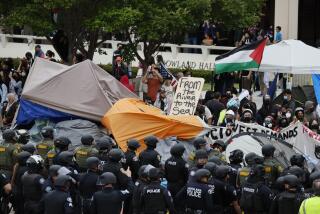USC cancels appearance by director Jon Chu, others amid valedictorian controversy

USC called off an appearance from director Jon M. Chu and other commencement honorees in the wake of growing controversy over its decision to cancel valedictorian Asna Tabassum’s graduation speech amid security concerns, the university announced Friday.
In a letter posted on its website, the university wrote that “given the highly publicized circumstances surrounding our main-stage commencement program,” it made the decision to “release our outside speakers and honorees from attending this year’s ceremony.”
“We’ve been talking to this exceptional group and hope to confer these honorary degrees at a future commencement or other academic ceremonies,” the unsigned letter said.
Asna Tabassum was selected as USC valedictorian and offered a slot to speak at graduation. The university canceled her speech after pro-Israel groups criticized her Instagram.
In March, the university announced that Chu, a USC alumnus and director of “Crazy Rich Asians,” would deliver the May 10 commencement speech at its main ceremony, which draws over 65,000 attendees.
Along with Chu, tennis legend Billie Jean King, National Endowment for the Arts Chair Maria Rosario Jackson and National Academy of Sciences President Marcia McNutt were set to receive honorary degrees.
King will still be the keynote speaker for the Annenberg School for Communication and Journalism’s satellite ceremony.
The university cited unspecified security threats in canceling the traditional valedictorian speech by Tabassum after pro-Israel groups launched a campaign against her because she posted a link on Instagram to a pro-Palestinian website criticizing Israel. The link contained content the groups considered antisemitic.
But in Friday’s round of cancellations, USC did not indicate there was any safety issue. Instead, it said it wanted to “keep the focus on our graduates.” There did not appear to be wide backlash against Chu, King or others.
USC declined to offer an interview about the unraveling commencement with President Carol Folt, who a representative earlier this week said had the “final decision” on the Tabassum cancellation and security matters.
Erroll Southers, the university’s associate senior vice president of safety and risk assurance, also declined to comment Friday.
Representatives for Chu and King did not respond to requests for comment. Jackson did not reply to a phone call and text message. McNutt did not reply to an email.
On Friday afternoon, graduating seniors posed for photos in their caps and gowns by the Tommy Trojan statue in the center of campus as other students walked about. Many said they were surprised and confused by the news.
Franco Gutierrez, a USC junior, called the move “awful” and “heartbreaking.”
“I didn’t think that is how they’d respond to the protest,” Gutierrez said.
“It’s ridiculous,” said a recent graduate — who did not give her name — as she walked on campus with enrolled students.
Christina Dunbar-Hester, a professor of communication, said in an email that “administrators have already embarrassed USC considerably and they owe Asna and the entire campus community an apology.”
“Many including myself are hoping to hear a fuller explication (including details about security concerns) and a path forward from our President, Carol Folt,” said Dunbar-Hester, who is the acting president of the American Assn. of University Professors USC chapter.
Friday’s move capped a week of intense debate over USC’s cancellation of Tabassum’s speech that included a campus protest that hundreds attended Thursday and criticism of USC by civil rights groups and politicians, including Democratic Reps. Ilhan Omar of Minnesota and Rashida Tlaib of Michigan.
The saga began Monday, when USC Provost Andrew T. Guzman released a campus-wide letter citing unnamed threats that poured in shortly after the university announced Tabassum as valedictorian and scheduled speaker. Guzman said attacks against the student had reached an “alarming tenor” and “escalated to the point of creating substantial risks relating to security and disruption at commencement.”
The complaints focused on a link on Tabassum’s Instagram profile to a pro-Palestinian website that said, “Zionism is a racist settler-colonialist ideology,” and “One Palestinian state would mean Palestinian liberation and the complete abolishment of the state of Israel” so that “both Arabs and Jews can live together.”
Guzman did not indicate what the threats were or against whom they were directed. A spokeswoman for the Los Angeles Police Department, Capt. Kelly Muniz, told The Times the agency had no crime reports regarding violent threats targeting Tabassum or the commencement ceremony.
Speaking to The Times on Tuesday, Tabassum defended herself and said she is not antisemitic. She said she supports the pro-Palestinian cause that has grown at college campuses since the Oct. 7 Hamas-led attack on Israel, which the Israeli government says killed 1,200 people and took about 240 hostages, before Israel’s retaliatory war in the Gaza Strip. Gaza health authorities say the war has killed about 34,000 Palestinians. According to the United Nations, 2 million Gazans are in near-famine conditions.
Campus administrators nationwide struggle to uphold principles of free expression amid pressure from those who claim speech, or potential speech, can subject students to harm.
“The university has betrayed me and caved in to a campaign of hatred,” Tabassum said.
On Friday, Tabassum — who still plans to attend graduation — declined to comment on the additional cancellations.
Times staff writer Matt Hamilton contributed to this report.
More to Read
Sign up for Essential California
The most important California stories and recommendations in your inbox every morning.
You may occasionally receive promotional content from the Los Angeles Times.














